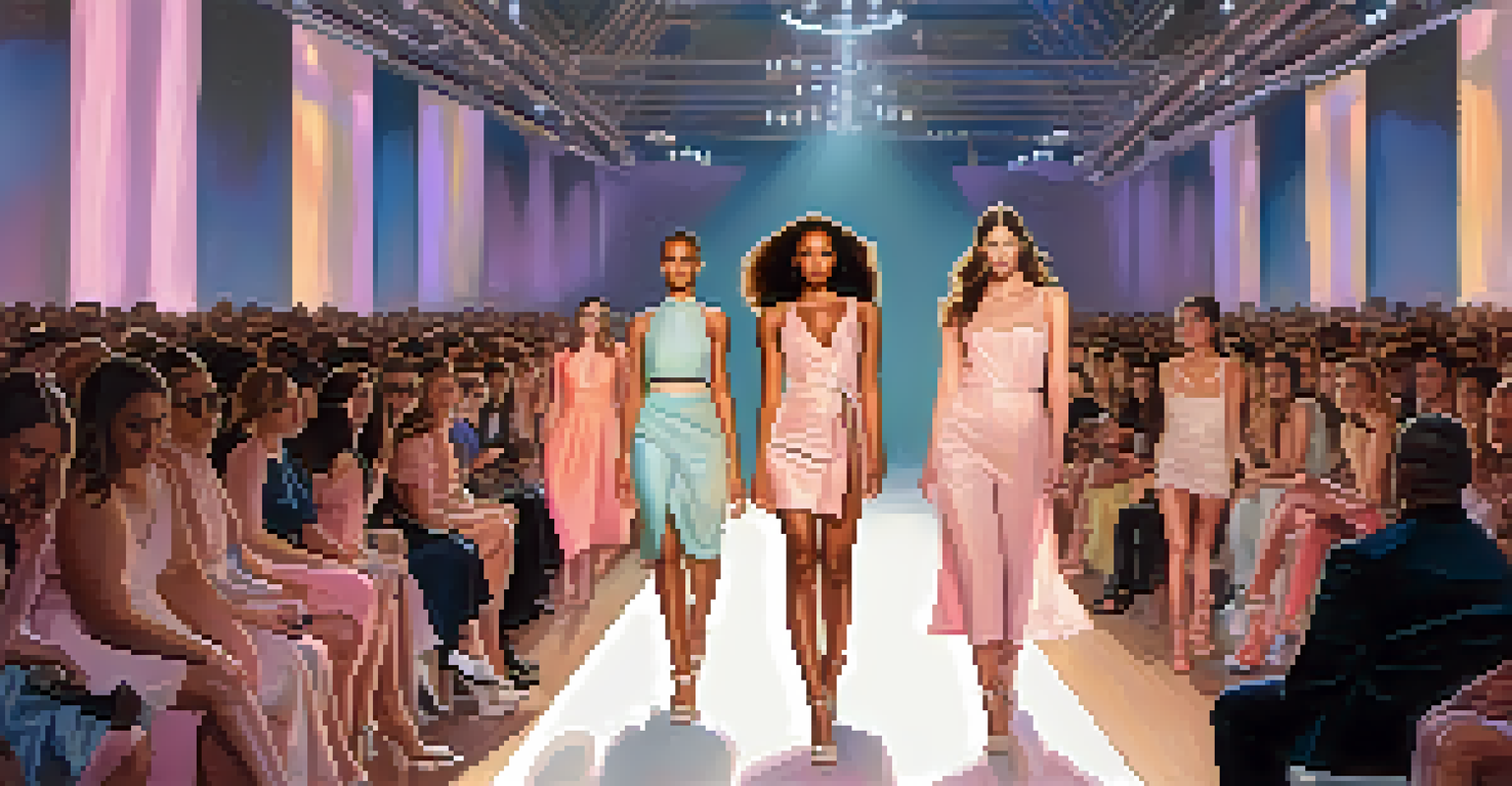Celebrity Influence: Fashion Icons and Body Image Representation

The Power of Celebrity in Fashion Trends
Celebrities have long held sway over fashion trends, often acting as trendsetters. When a Hollywood star steps out in a particular outfit, it can cause a ripple effect in the fashion world, leading to widespread adoption by fans. This influence can be seen in everything from red carpet looks to casual streetwear, as many people seek to emulate their favorite stars.
Fashion is about dressing according to what’s fashionable. Style is more about being yourself.
Take, for instance, the impact of the Kardashians on body shape ideals in fashion. Their prominence has shifted the standard of beauty, making curves more celebrated than ever before. This serves as a reminder of how celebrity culture can reshape societal norms and encourage a specific aesthetic.
However, while celebrity influence can empower many, it also raises questions about authenticity and diversity in fashion. Are we merely following trends set by a select few, or is there room for individuality in our style choices? It's a complex interplay that continues to evolve.
Body Image and the Role of Fashion Icons
Fashion icons play a crucial role in shaping body image perceptions, often reflecting or challenging societal standards. Celebrities like Lizzo and Ashley Graham have made significant strides in promoting body positivity and inclusivity, showcasing that beauty comes in all shapes and sizes. Their visibility encourages fans to embrace their bodies, fostering a sense of acceptance in a world often fixated on unrealistic ideals.

On the flip side, traditional fashion icons have sometimes perpetuated narrow beauty standards. The predominance of thin models on runways and in advertisements can lead to harmful comparisons and self-esteem issues among viewers. It's essential to recognize the impact these images can have on individuals, especially young people who are still forming their self-image.
Celebrities Shape Fashion Trends
The influence of celebrities can significantly drive fashion trends, impacting societal norms and personal style choices.
As discussions around body image evolve, so too does the responsibility of fashion icons. By advocating for diversity and inclusivity, they can inspire a broader acceptance of all body types, paving the way for a healthier relationship with fashion and self-image.
Social Media: A New Platform for Celebrity Influence
Social media has revolutionized the way we consume fashion and body image content. Platforms like Instagram and TikTok allow celebrities to share their personal style directly with fans, making fashion more accessible than ever. This immediate connection can foster a sense of community, where fans feel closer to their idols and more inspired to express their own styles.
You can never be overdressed or overeducated.
However, social media also has a darker side. The pressure to present a perfect image can lead to unrealistic portrayals, with many celebrities editing their photos to fit a certain mold. This can create a false narrative that negatively affects followers, leading to anxiety and dissatisfaction with their own bodies.
Ultimately, the challenge lies in finding balance. While social media can empower individuals to embrace their unique style, it's vital for both celebrities and followers to promote authenticity and self-acceptance in the face of curated perfection.
The Evolution of Fashion: From High Fashion to Street Style
The fashion landscape has evolved dramatically over the years, moving from the exclusive realm of high fashion to a more inclusive approach that celebrates street style. Celebrities now often blend high-end pieces with everyday wear, making fashion feel more attainable. This shift has democratized style, allowing fans to mix and match trends without the need for a designer budget.
For example, when celebrities like Rihanna or Billie Eilish incorporate vintage or thrifted items into their outfits, they send a message that fashion is about personal expression rather than brand allegiance. This has encouraged fans to explore their own creativity and redefine what it means to be fashionable.
Diversity in Fashion Matters
Championing diversity in fashion representation fosters inclusivity and encourages a broader acceptance of various body types and backgrounds.
However, as street style becomes mainstream, it raises questions about originality and cultural appropriation. It's crucial for fashion icons to navigate this landscape thoughtfully, ensuring that they honor the roots of various styles while promoting inclusivity and respect.
The Importance of Diversity in Fashion Representation
Diversity in fashion representation is more important now than ever. As audiences become increasingly aware of the need for inclusivity, the demand for varied body types, ethnicities, and backgrounds in fashion is rising. Celebrities who champion diversity can inspire brands to broaden their horizons, leading to more authentic representations in marketing and media.
For instance, the rise of models like Winnie Harlow, who has vitiligo, challenges traditional beauty standards and opens the door for others with unique features. This shift not only empowers those individuals but also encourages society to celebrate differences rather than conform to a singular ideal.
Moreover, when fashion brands embrace diversity, they not only attract a wider audience but also foster loyalty among consumers who feel represented. This shift is a win-win for both the industry and the fans, promoting a culture of acceptance and understanding.
The Impact of Celebrity Collaborations on Fashion Brands
Celebrity collaborations with fashion brands have become a powerful marketing tool in recent years. When a well-known figure partners with a brand, it often leads to increased visibility and sales, as fans rush to emulate their style. These collaborations can also help bring new aesthetics and ideas to the forefront, enriching the fashion landscape.
Take, for example, the collaboration between Beyoncé and Adidas for her Ivy Park line. This partnership not only showcased her unique vision but also emphasized the importance of inclusivity and body positivity in sportswear. Such collaborations often resonate deeply with fans, creating a sense of community around shared values.
Social Media’s Dual Impact
While social media democratizes fashion and personal expression, it also poses challenges by promoting unrealistic beauty standards.
However, it's essential for brands to focus on authenticity in these partnerships. When a celebrity genuinely believes in the brand and its mission, it translates to a more meaningful connection with consumers. This authenticity can foster brand loyalty and inspire fans to embrace the message behind the fashion.
Challenges and Critiques of Celebrity Influence in Fashion
Despite the positive aspects of celebrity influence in fashion, there are significant challenges and critiques to consider. One major concern is the pressure it places on individuals to conform to certain beauty standards, often leading to unhealthy behaviors. The glorification of particular body types can perpetuate body image issues, especially among impressionable youth.
Additionally, the fast-paced nature of celebrity-driven trends can encourage a throwaway culture, where consumers feel compelled to constantly update their wardrobes. This not only strains personal finances but also has detrimental effects on the environment, as fast fashion practices continue to grow.

Addressing these challenges requires a collective effort from celebrities, brands, and consumers alike. By promoting sustainable practices and fostering body positivity, the fashion industry can work towards a healthier relationship with style and self-image.